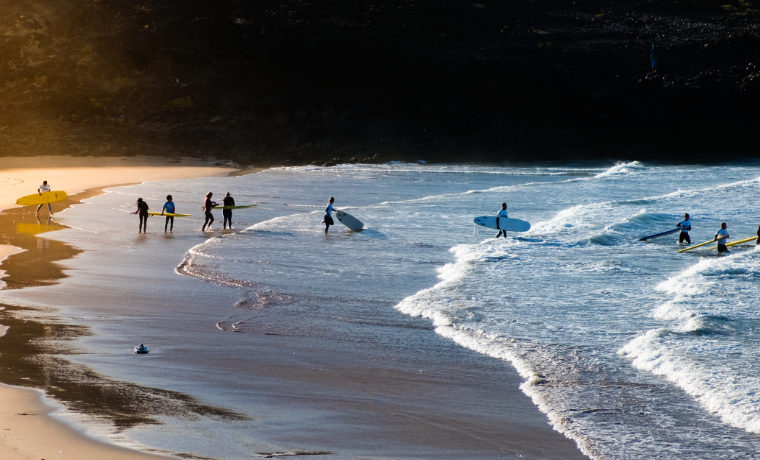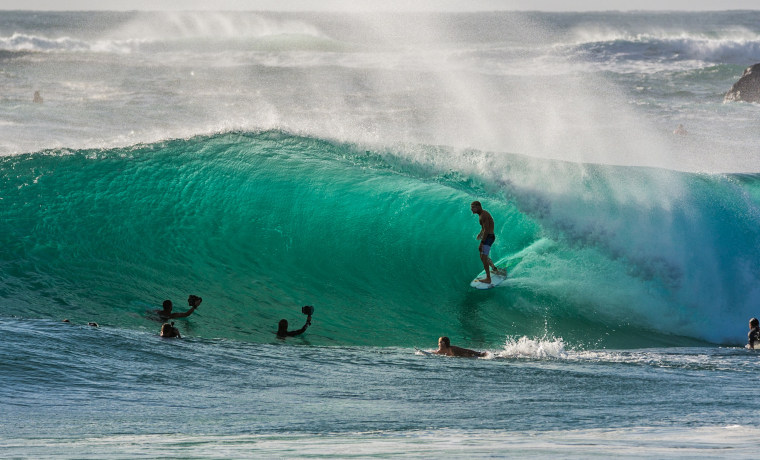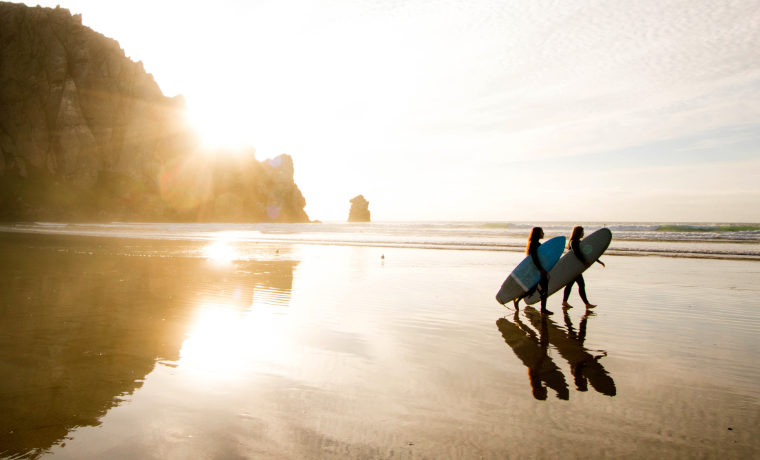While speaking like a surfer probably won’t make you better at carving up the waves, knowing some surfing lingo will make communicating with the other people out on the water much easier.
The good news is that speaking like a surfer isn’t all that difficult, provided you get a handle on some essential surfer slang and surfing terminology. Plus, surfing lingo isn’t just about your time in the surf. Knowing you the right terms for surfing will enable you to describe your experience to other surfers in a much more concise and understandable way. This will then help you learn and progress more quickly so that you can truly enjoy the wonderful benefits of surfing.
In this article, we reveal 35 of the most common surfer phrases. And no, cowabunga dude is not one of them!
Essential surf lingo
All sports and outdoor activities have a language all their own, but surfing takes the cake for using the most weird and wonderful words and terms. Here are 35 of the most widely used surf sayings.
01Stoked
Are you feeling happy or exhilarated? In surfing terms, you are stoked. You can be stoked to see a fellow surfer or just stoked to be out on the water. We hope all your surfing adventures leave you feeling stoked – to the max!
02Line-up
The line-up is the area just behind the breaking waves where surfers gather before catching a ride to the beach. It’s an excellent place to hang out and chat with your fellow surfers while waiting for the next surfable wave.
Line-ups usually work on a first come first served basis, so if you’ve just caught a wave and have paddled back out, you are last in line for the next wave.
03Set
A set is a group of two or more waves. Like buses, waves are either conspicuous by their absence or several turn up at once. Waves that arrive in sets are generally bigger and better than singles.
04White water
White water is the surfer word for when a wave breaks and the water becomes foamy. This area is also called the break zone. Beginners usually learn the basics of surfing in the white water, while for more experienced surfers, it usually indicates the end of their ride.
05Kook
A Kook is surfer dude slang for someone who doesn’t know how to behave out on the water. Maybe they jump the line and catch a wave when it’s not their turn or cut across the path of another surfer. Beginners are often accidental kooks, but more experienced surfers will soon show you the error of your ways and set you straight.
06Newb (or noob)
A newb is a surfing neophyte or newbie. This is not meant to be a derogatory term, and all surfers were newbs once. So keep practicing, and you’ll eventually shrug off your newb status.
07Swell period
The swell period is the time between waves. Also known as the wave period, the longer the swell period, the more powerful the wave tends to be. Swell period is an important factor when deciding which surf spot to head to. Most surf condition apps use this term.
08Offshore
Wind direction matters with surfing. Offshore winds blow from the land out to sea. This helps hold the wave up and makes it cleaner and more surfable. Surfers like an offshore wind!
09Onshore
An onshore wind blows from the water toward land. This wind direction pushes the wave over and makes it less surfable. So, if you can, seek out surf spots with an offshore wind. This may mean going to the opposite side of the coast.

10Quiver
Your quiver is your collection of surfboards. Surfers often have more than one board, so they can choose the best one for the conditions, e.g., a short board for big waves and a longboard for flatter days.
11Leash/leggie/leg rope
Your leash, also known as a leggie or leg rope, is the cord that attaches your board to your ankle. This stops your board from floating away when you fall off. However, on the downside, it also means your board could hit you if you’re caught in a powerful wave. But, better if it hits you than a stranger, or you end up losing your board entirely.
12Drop-in
No one likes a drop-in! A drop-in is a surfer that hops on a wave that someone is already surfing. Dropping in is the height of bad manners and a real kook thing to do. So, don’t drop-in on another surfer’s wave!
13Duck dive
Paddling out in big waves is hard, especially as you go through the breakers. A duck dive is a technique surfers use to avoid having to paddle over the top of a wave. It involves pushing the nose of your board downward, so you submerge and dive beneath the wave. This is an essential skill, especially when paddling out through large waves.
Some surfers also do a turtle roll, which is like a duck dive, but you flip onto your back with your board above you as you pass under the wave.
14Goofy vs. regular footed
These terms are funny surfer slang for being left or right foot forward on your board. Goofy-footed people will have their right foot in front of their left. In contrast, a regular-footed surfer has their left foot forward. Goofy vs. regular footed stance is usually determined by left or right-side dominance.
15Caught inside
Being caught inside means you are stuck between the shoreline and the break zone. This usually happens after you’ve fallen off your board before reaching the shore. It can be a tricky area to escape from, especially if set after set of waves are rolling in. You’ll probably need to duck-dive your way back toward the line-up, which is often tiring.
16Pocket
The pocket is the part of the wave just in front of the lip/crest and usually where it is steepest. It’s also the most desirable place to surf and tends to produce the fastest, smoothest ride. Stay in the pocket, and you’ll be stoked!
17Barrel/tube
Hollow waves, where the top curls over to form a tunnel, are called barrels or tubes in surf jargon. Some surfing spots are famous for producing surfable barrels, e.g., Pipeline in Hawaii, while in other places, they’re a rare occurrence. Barrelling or tubing (surfing inside a wave) is at the top of most surfer’s bucket lists.
18Hang ten
Hang ten is an example of stereotypical surfer slang that’s made it into common usage. It comes from old-school longboard surfing and refers to a trick in which the surfer stands right at the front of their board with their toes hanging in the water. Those longboard dudes were cool!
19Bomb
A bomb is an uncharacteristically large wave. If you are in the line-up and you see a bomb coming your way, you had better start paddling hard and ride it in, so it doesn’t come crashing down on you.
20Pop-up
The pop-up is one of the first skills a budding surfer needs to master. It’s the surfing term for going from being prone to standing on your board. You can’t do this move slowly, or you’ll end up missing your wave or falling over. Instead, you do it fast but smooth, literally popping up into your surfing stance.

21Wipeout and rag-dolling
These surfing idioms often go together like sex and wax! A wipeout is when you fall off your board, and rag-dolling happens when you get caught in the wave and tossed around like a, well, rag doll. This is also known as being in the washing machine.
22Going over the falls
In surfing terms, going over the falls means wiping out off the back of a wave. If you go over the falls, it’s a safe bet that you missed the pocket and were too high on the wave or were going too slowly to properly catch your wave.
23Thruster
A thruster is a surfboard with three fins. Thrusters are fast and stable and probably the most common fin configuration on modern boards.
24Dawn patrol
The dawn patrol are surfers who like to head out early in the morning, preferably at sunrise. Breaks are usually less crowded at this time of day, and the conditions are often at their best. A dawn patrol surf is often called a dawny.
25Shore break
A shore break is when waves break close or right on the shore and are usually caused by very shallow beaches. Shore breaks make it hard to paddle out, and you can get roughed up a fair bit if you wipe out close to the water’s edge.
26Closeout
A closeout happens when a wave breaks all at once along its entire length. Surfing a closeout is risky as you have nowhere to go and are bound to end up in the washing machine.
27Indo
Short for Indonesia and considered to be one of the ultimate surfing destinations. There are breaks to suit all abilities, the water is warm, and the cost of living is cheap. Indo is a surfer’s paradise.
28Pura Vida
Pura Vida is a Costa Rican expression that means optimism, happiness, and living life. It’s used by the locals as a friendly greeting and nicely sums up the surfing lifestyle.
29Ding
A ding is damage to your surfboard. Most dings are caused by hitting rocks, but you could also get a ding by hitting another surfer’s board. Dings should be repaired as soon as possible; otherwise, your board could soak up water and lose its buoyancy.

30Overhead
Overhead is one of the surfer words for a wave that’s taller than you are. However, like a fisherman’s tale, some surfers may exaggerate the height of a wave, and it might only be knee-height or appear overhead because they were sat on their boards. Real overhead waves are pretty darn big!
The opposite of an overhead is an ankle slapper, i.e., a wave so tiny it barely covers your feet.
31Cutback
A cutback is a manoeuvre where the surfer changes direction on the face of the wave by carving the board from the flat part of the wave back towards the pocket to gain more speed. This is an important skill for intermediate surfers and will extend the length of your ride.
32Bro
Bro is a friendly term used by surfers when speaking to one another. For example, “Hey bro, that wave was sick!” Translation: Hello, fellow surfer, that wave was very exciting.”
33Shaka
This is the hand sign that surfers use to indicate no worries or hang loose. It’s the closest thing surfers have to a salute.
34Betty
Betty is surfer slang for girl who surfs. It’s unclear where this term comes from, but it may relate to famous Bettys such as Betty Grable, Betty Boop, or Betty Page – even Betty Rubble of the Flintstones.
35Wettie
Your wettie is your wetsuit. Surfing wetsuits are essential equipment for colder waters, like those around the UK, and are often worn with a rash vest, booties, gloves, and a hood. Winter wetsuits are thicker and warmer than summer wetsuits. A shorty is a summer wetsuit with cut-off arms and legs.
Peeing in your wetsuit is one of those things that everyone does, but no one really talks about. And while it’s okay to pee in your own wetsuit, as it’s a quick way to warm it up, you should never pee in a loaner or friend’s wetsuit. It’s like an unwritten law, bro.
Surfing lingo – closing thoughts
Many of the terms that surfers use sound like a foreign language. Especially when paired with a put-on West Coast drawl. But, if you hang out with surfers long enough, you’ll soon start picking up the lingo. Use this guide to the essential surfing words and terms to get the gist of what your fellow surf bros and Bettys are talking about.
The post Surfing Lingo: 35 Essential Surfing Words appeared first on Cool of the Wild.


